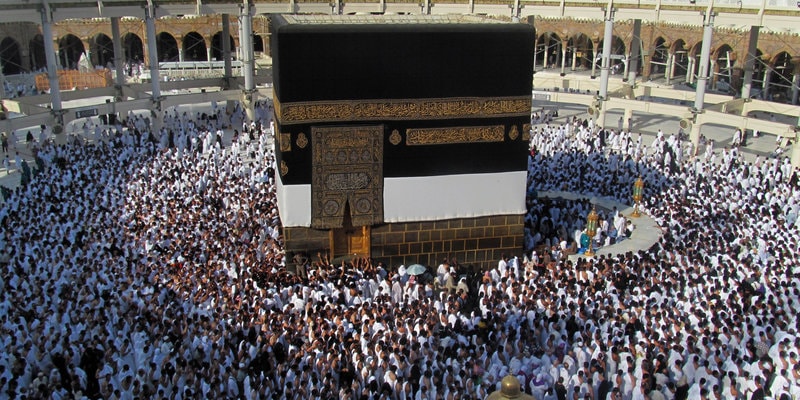The month of Dhul Hijjah is one of the most sacred and blessed months in the Islamic calendar. It is the month of Hajj and the month of Eid al-Adha. This is the month in which the Messenger of Allah (Peace be upon him) has said:
“There are no days more beloved to Allah that He be worshipped in them than the ten days of Dhul-Hijjah, fasting every day of them is the equivalent of fasting a year, and standing every night of them (in prayer) is the equivalent of standing on the Night of Qadr.” (Tirmidhi)
As we begin the blessed first ten days of the month of Dhul-Hijjah, here are some reminders on acts of worship that a Muslim can engage in to earn reward during these days.
>> Understand the Quran in as little as 10 minutes/day. Click here to learn more
As the Messenger of Allah (peace be upon him) has reportedly said, fasting the first ten days is like fasting for a whole year. Do your best to fast in these first nine days before Eid, and even if you can’t fast all, it is highly encouraged to fast on the day of Arafah, the 9th day of Dhul-Hijjah.
Abu Qatadah Al-Ansari (RAA) narrated, “The Messenger of Allah (SAW) was asked about fasting on the day of Arafah (the 9th of the month of Dhul Hijjah). He replied, “Fasting on the day of Arafah is an expiation for the preceding year and the following year.” (Bulugh al-Maram)
Reciting the Quran
These are days that have been likened to the month of Ramadan, so definitely all good deeds are encouraged the same way that they have been encouraged in the month of Ramadan. Even though the nine days of Dhul-Hijjah are shorter, make every minute count by reciting as much Qur’an as you can.
Recite it while in commute on your mobile devices, spend some time with your Mushaf at home, and spend time contemplating the words of Allah (ta’ala) in these glorious days.
Doing Dhikr
The takbir is one of the best words that our tongues can utter in these first nine days of Dhul-Hijjah.
“And remember Allah during the appointed Days” (al-Baqarah 2:203)
This is a time to constantly keep our tongues moist with the remembrance of Allah (ta’ala) and the best words that we can recite is the takbir:
Allaahu akbar, Allaahu akbar, Allaahu akbar, laa ilaaha ill-Allaah, Allaahu akbar, Allaahu akbar, Allaahu akbar, wa lillaahi’l-hamd
(Allah is Most Great, Allah is Most Great, Allah is Most Great, there is no god but Allah, Allah is Most Great, Allah is Most Great, Allah is Most Great, and to Allah be praise).
There is no limit to how many times we can say it, neither is it restricted to a certain place. It is common practice to recite it on the day of Eid, when you are going to and coming back from the masjid, but this does not mean that we shouldn’t recite it at other times. Recite as much as you can in these first nine days of Dhul-Hijjah.
You may also like: For the Sake of Allah
Giving Charity
If giving charity gets us multiple rewards in the month of Ramadan, imagine that the same is for the first nine days of the month of Dhul-Hijjah. As we strive to increase our good deeds in the sight of Allah (ta’ala), it is encouraged to increase our good deeds towards other people too.
Help people break their fasts, donate to charities, relieve your brother of a worry in this world so that Allah (ta’ala) can relieve you of a worry in the hereafter.
“Whoever relieves a Muslim of a burden from the burdens of the world, Allah will relieve him of a burden from the burdens on the Day of Judgement. And whoever helps ease a difficulty in the world, Allah will grant him ease from a difficulty in the world and in the Hereafter.” (Tirmidhi)
Sacrificing an Animal
The story of Prophet Ibraheem (AS) is poignant for us in the month of Dhul-Hijjah, and his obedience and reliance on Allah (ta’ala) forms the basis for us Muslims offering animals as sacrifice on the day of Eid.
Many Muslims believe that only a certain group of people offer the sacrifice, but this is not so.
The Messenger of Allah (ﷺ) said: “Sacrifice only a full-grown animal unless it is difficult for you, in which case sacrifice a lamb.” (Abu Dawud)
Islam is a religion of ease, and we have been granted the opportunity to do what we are capable of. But it is still important to not overlook this act of worship and fulfill it in the hope of earning rewards from our Lord.
The month of Dhul-Hijjah is a blessed month that even Allah (ta’ala) tells us about. It is a month that is full of events that shape our lives as Muslims and we should strive to seek out all the benefits of this month as much as we can.




ASSALAAMU ALAIKUM WARAHMATULLAH WABARAKATUHU
JAZAK ALLAHU KHAIRAN!MAY ALLAH SUBHANO WATA AALA bless you all best of both the worlds and accept all the good deeds and duas Aameen.
ASSALAAMU ALAIKUM WARAHMATULLAH WABARAKATUHU
[…] diadaptasi dan diterjemahkan dari : https://quranacademy.io/blog/dhul-hijjah-beneficial-acts/ […]